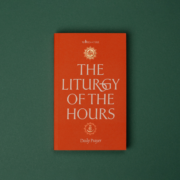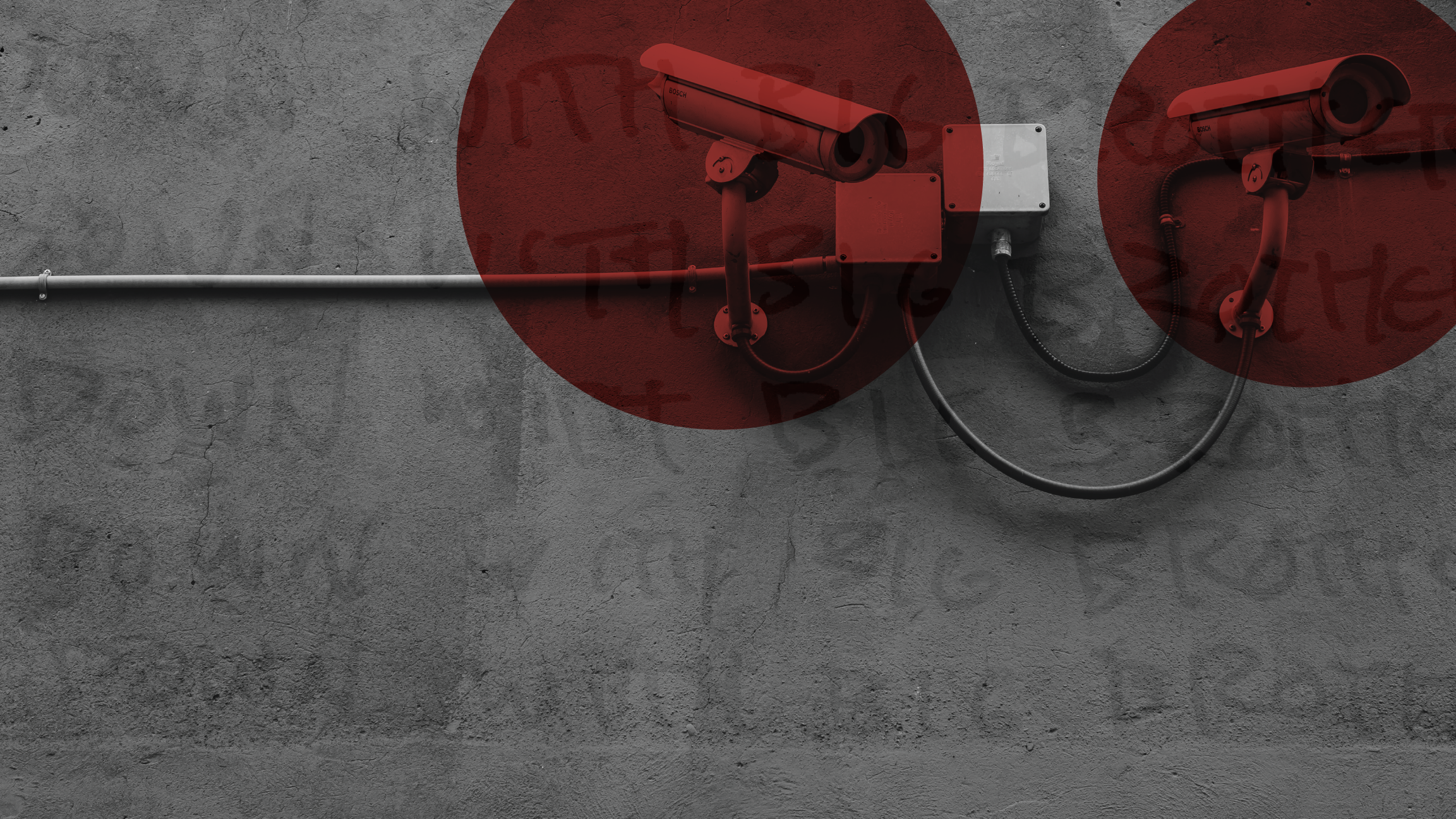This piece first appeared in the Winter 2021 “Freedom” issue of Evangelization & Culture, the quarterly journal of the Word on Fire Institute. Today, on this 72nd anniversary of George Orwell’s death, we examine the Catholic sensibility of his masterwork, 1984. You can learn more and become an Institute member today to read more pieces like this.
The jury is out about which twentieth-century novel will prove to have best predicted the worst-case scenarios of our modern trials. George Orwell’s classic 1984 is an obvious contender, and as far as capturing our darkest fears about the loss of human freedom, it simply has no peers. Likewise, it is the best-known novel of the entire dystopian genre. It is still read in most schools in the English-speaking world, and various television and film adaptations of the novel, including Michael Radford’s version starring John Hurt and Richard Burton, have kept Orwell’s bleak vision alive in the popular imagination. The late Christopher Hitchens reminds us that the enduring power of 1984 is summed up in the adjective “Orwellian,” which stands for the “sloganized thinking” that free people ought always to avoid.
Born out of Orwell’s own commitment to socialism but accompanied by a total rejection of the totalitarian brutality of the Soviet Union, 1984 captures something of the real-world dehumanization that Stalin imposed on his people. It also serves as a warning to all the free peoples of the earth, including Orwell’s own postwar British society. Through technocratic propaganda, people can be coerced not only to accept lies instead of truth for fear of torture or death, but they may even have their whole interior life obliterated. As Orwell’s protagonist, Winston Smith, eventually learns, it is not enough for “Big Brother” to kill you when you oppose him. He and his servants will stop at nothing less than making you forget you could ever exist without his dominance. In his 1991 encyclical letter Centesimus Annus, Pope St. John Paul II, who lived under a Communist regime for much of his life, described something like the world of Oceania, Orwell’s fictional, post-nuclear-war transatlantic dictatorship:
In the totalitarian and authoritarian regimes, the principle that force predominates over reason was carried to the extreme. Man was compelled to submit to a conception of reality imposed on him by coercion, and not reached by virtue of his own reason and the exercise of his own freedom.

As we read the opening pages of 1984, we hope that Winston will someday be vindicated like the Czech dissident Václav Havel or the Soviet dissident Aleksandr Solzhenitsyn were in real life. Maybe Winston’s suffering for the sake of irrepressible truth will bring hope to future generations, who can imagine a humane alternative to the regime of Oceania. As Pope Benedict XVI asked in the context of Jesus’ proclamation of the kingdom, “Is it not true that the great dictatorships were fed by the power of the ideological lie and that only truth was capable of bringing freedom?”
Like Havel and Solzhenitsyn, Winston’s initial rebellion against Big Brother is literary. If he is free in his own mind, he can reject the regime’s “Newspeak” and express the truth in real words for posterity. Winston acquires a small writing journal, and he tells himself as he begins his illicit endeavor, just out of view of the telescreen in his room, “To mark the paper is a decisive act.” Even to write down the correct date is an expression of belief in permanent things that Big Brother seeks to obscure. Before long, Winston is seized with a liberating madness, and he writes “DOWN WITH BIG BROTHER” repeatedly.
Winston’s rebellion takes a new turn when he meets Julia, who lures him into the political act of an illicit affair by slipping him a paper that says “I love you.” Winston deludes himself into believing that sexual liaisons with Julia may be ordered to some social good—that sex is freedom. Again, St. John Paul II understands the mind of a person yearning for meaning amid nonsense and having to settle for a carnal, counterfeit version of it: “In a world without truth, freedom loses its foundation and man is exposed to the violence of passion and to manipulation, both open and hidden.” Winston almost figures out his mistake before he is arrested, telling Julia, “You’re only a rebel from the waist downwards.”

Winston finally realizes that there may not be any free future in written words, nor with sexual encounter, nor with the culturally unconquerable “Proles.” Instead, the powers-that-be have taken violent control of the answer to Pilate’s haunting question of Jesus: “What is truth?” (John 18:38). In the end, Winston not only consents to absurdities like 2 + 2 = 5, but under torture from O’Brien, whom Winston foolishly imagined an ally, he leaves reason and will behind entirely. The words of Winston’s coworker Syme prove true. In the artificial reality of Big Brother’s regime, “Orthodoxy means not thinking—not needing to think. Orthodoxy is unconsciousness.”
In an essay called “Propaganda and Demotic Speech,” published just a few years before 1984, Orwell offered insight into the kind of control despots of all eras exerted over the masses. Slogans alone, he argued, are ubiquitous but generally ineffective for the simple but important reason that “propaganda only seems to succeed when it coincides with what people are inclined to do in any case.” What matters to tyrants, then, is controlling the minds behind the words. Orwell, who was both fascinated and repulsed by Catholicism, particularly pointed to the emptiness of churches as an example of the futility of counterintuitive persuasion. Christianity was meant to be a revolution both for the individual and the world, but by the mid-twentieth century, no one much cared anymore.
Christian communities are unlikely to prevail if they are just one more voice in a chorus of propaganda, just as Orwell observed about the empty churches of his own day.
On this point, the Christian evangelist may offer a word of correction to the likes of Orwell and solace to those who believe the world may be headed toward Orwell’s 1984 nightmare. Before Winston is finally, fully broken to the will of Big Brother and his totalitarian servants, he believes that “to die hating them, that was freedom.” Big Brother’s final victory over Winston is, therefore, the manipulation of real hatred into artificial love. A disordered self can easily become a totally false self.
But what if Winston had been a different self—an embodied soul conditioned to love his enemies and pray for those who persecuted him? What if Winston had been able to think with the mind of Christ in 1984, possessing interior strength formed by prayer and sacramental grace? Orwell’s premature death may have robbed him of the eventual discovery that real faith in Christ in the Church was not assent to a largely benevolent but empty propaganda. But he appears to have come close. Writing in the Spectator in 2011, Robert Gray noted that Orwell had concluded by June 1945, just prior to publishing Animal Farm, that “the religious attitude to life must be restored.” Orwell came to see that his fear of a boot smashing the face of the individual forever—Winston Smith’s moral fate—would be facilitated in our world by the total collapse of authentic Christian belief. Gray elaborates,
For nearly two thousand years, Orwell pointed out, the Western concept of good and evil had been tied up with the idea of personal immortality. The hope of heaven and the threat of damnation had seemed real enough to foster altruism and self-sacrifice. But if death extinguishes the individual, what incentive could there be to cling to moral principle against worldly interest?
It takes just a few short steps to go from casting aside a Church that helps us realize what we are free for to a highly impressionable, individualistic view of what we should be free from. We arrive at an intractable battle of subjective experiences, with the strongest human will exerting itself over those who are content to live by lies, provided their basic needs are met. In this way, Christian communities are unlikely to prevail if they are just one more voice in a chorus of propaganda, just as Orwell observed about the empty churches of his own day.

But an other-worldly Church, filled with individuals whose reason and will are shaped by the gift of faith, not only remains a viable alternative to Big Brother but is guaranteed to outlast him. In Christ, our non-coercive King, whose service is perfect freedom, the table is flipped on the likes of O’Brien and others in our world like him, who “are interested solely in power.” St. Paul concludes a litany of torture he has endured with the words, “If I must boast, I will boast of the things that show my weakness” (2 Cor. 11:30). And yet, he also declares, “I can do all things through him who strengthens me” (Phil. 4:13). In the Catholic Church, man’s weakness and God’s strength are reconciled in every person through the objective reality of a faith once delivered to the saints and handed down undefiled to the present day.
St. John Paul II concludes Centesimus Annus, “It is Christ who made man’s way his own, and who guides him, even when he is unaware of it.”
And that goes for Winston Smith too.
